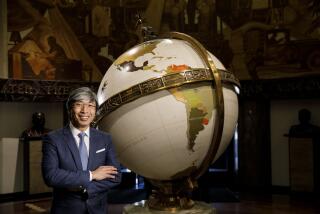Bill Thomas, a Times editor during the glory times, dies
There are real-life newspaper editors like the ones you see in the movies, the ones who swagger and swashbuckle and cuss and scrap.
Bill Thomas was not one of those editors.
He was urbane, dapper, cool and collected, an editor to match the sophisticated, urbane Los Angeles whose newspaper he edited through the 1970s and 1980s.
William F. Thomas died Sunday. He was 89, and he was editor of the Los Angeles Times through the storied, glory decades when the paper grew from a regional booster sheet into a newspaper of national influence and international renown.
Unlike editors who plunge into the inky daily morass of the newsroom, Bill didn’t mill around his reporters’ desks. His job was to do what his editors couldn’t: be a human firewall against angry advertisers and miffed civic leaders who didn’t much like what they’d seen in print about them or their pals.
His techniques were subtle, not strong-arm. He created a “senior writers” group, with regular monthly meetings to mull over big journalistic issues; it was said that he formed it to flatter and corral a particularly contentious reporter who buttonholed Thomas at every opportunity. It worked; the reporter thereafter waited for the monthly meetings to give Thomas a piece of his mind.
From my lowly rung as a junior reporter, Thomas seemed to be unflappable, and the stories about him matched that.
Mike Faneuff, now on the Times’ foreign desk, tells one. Faneuff began his career here as a copy messenger.
With his long hair, overalls and scruffy leather bag, he squeezed into an elevator as the doors were closing one day, puffing and sweating from making messenger “rounds” through the Times’ downtown government bureaus.
He turned to see the publisher Tom Johnson, the editor Thomas ... and former President Gerald Ford, braced by two glowering Secret Service agents. Faneuff looked at Ford, and said, “Hey, Mr. President — I’ll catch the next one!” He slid out of the elevator as Thomas burst out laughing.
Thomas expanded the paper’s reach locally and in the world, adding bureaus and editions. He was sure that, like him, readers loved spellbinding real-life stories, so he sent reporters to South America in search of giant leeches and into the heart of L.A. to tell the life story of conjoined twins.
Thomas’ critics believed that this grand adventure in journalism neglected the shoe-leather daily local reporting that is a newspaper’s meat and potatoes.
He was also characterized, most recently by former Timesman David Cay Johnston in a Facebook post, of being too cozy with the police chief (they played golf regularly every weekend) and, famously, too willing to delay a story at the behest of the CIA (the Glomar Explorer’s mission to salvage a Soviet submarine).
And during his years at The Times, the number of women and minorities hired and promoted grew, but not fast enough.
Yet Thomas handed writer David Shaw the portfolio to write critically about The Times itself, groundbreaking stories that won Shaw and the paper a Pulitzer Prize and set a standard for newspaper ombudsmen.
Ultimately, on Thomas’ watch, the Times won 11 Pulitzers, including the gold medal for public service for special coverage of the region’s burgeoning Latino community. And finally, the staff began to look more like the population the paper served.
Newspaper journalism has to work on many levels. There’s the detailed, exhaustive reporting that brought the Bell scandal to readers, to voters and ultimately to the courts. There’s the finesse of a book review, the donnybrook prose of a sports column. I have seen colleagues poring over property maps just to be able to use the authoritative preposition to say whether an assault happened “at” or “near” a place — a kind of precision that wouldn’t even occur to a reader, unless we got it wrong.
We battle every day to make the smallest link in every story as strong and sound as the biggest one. The vital importance of having editors who’ve got your back is something we take for granted, until they’re not there. In his immaculate shirts and coiffed silver hair, Bill Thomas had his staff’s back, and its gratitude.
ALSO:
Can car-happy LA learn to share the road?
Why California needs the young if it’s to thrive
Follow Patt Morrison on Twitter @pattmlatimes
More to Read
A cure for the common opinion
Get thought-provoking perspectives with our weekly newsletter.
You may occasionally receive promotional content from the Los Angeles Times.







